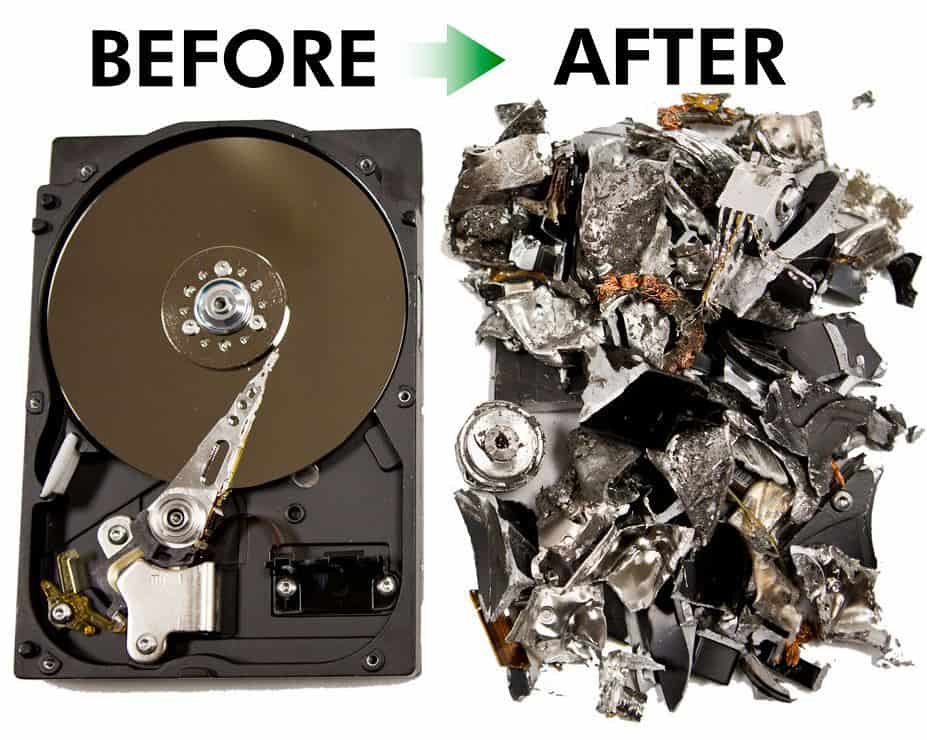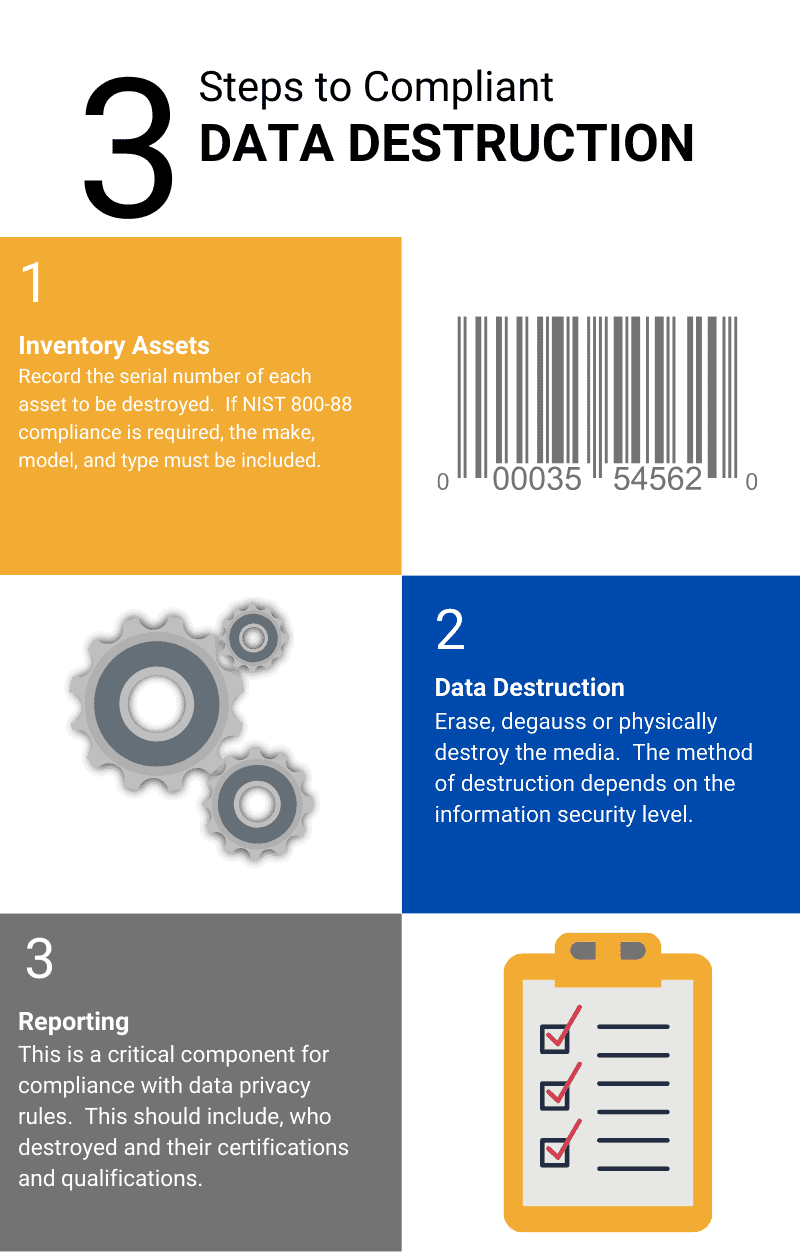Leading Tips for Ensuring Secure Data Destruction in Your Cyber Security Strategy
Leading Tips for Ensuring Secure Data Destruction in Your Cyber Security Strategy
Blog Article
The Important Nature of Information Devastation in Upholding Computer System Security Services and Protecting Versus Unauthorized Accessibility
In a period where information violations and identity theft are increasingly prevalent, the significance of reliable data devastation can not be overstated. Organizations must recognize that the failing to effectively dispose of delicate details presents not only legal and monetary risks but additionally a prospective erosion of client trust fund. Different techniques, from information cleaning to physical destruction, function as vital safeguards versus unauthorized access. Understanding the implications of information devastation practices and conformity with policies elevates necessary questions concerning the adequacy of current approaches and their lasting practicality in the face of evolving threats.
Value of Information Devastation
In a significantly digital world, the significance of information damage can not be overstated. As companies amass vast amounts of delicate information, the possible effects of stopping working to effectively dispose and handle of that information come to be significantly extreme. Information violations, identification theft, and corporate espionage position considerable risks, highlighting the need of reliable information devastation techniques.

Furthermore, as technology develops, so as well do the techniques by which harmful stars look for to make use of sensitive info. Organizations has to continue to be positive and attentive in their data damage techniques to safeguard versus these evolving threats. By focusing on data damage, companies not just protect their assets yet likewise foster trust amongst stakeholders and clients, demonstrating a dedication to liable data management and safety methods.
Techniques of Effective Information Destruction
To make certain the irreparable and complete devastation of delicate data, companies can use a variety of reliable methods customized to their details demands. Among the most usual methods is information cleaning, which includes making use of specialized software to overwrite existing information multiple times, making recuperation essentially impossible. This is specifically beneficial for solid-state drives and hard drives, where conventional deletion techniques are poor.
One more efficient approach is degaussing, which makes use of strong magnetic fields to interrupt the magnetic domains on storage space media, providing the data irretrievable. This technique is especially fit for magnetic storage devices, such as tape drives and hard drives.
Physical destruction is likewise a sensible choice, involving the shredding, squashing, or incineration of storage gadgets. This approach assurances that data can not be recuperated, making it ideal for organizations taking care of very delicate info.

Compliance With Information Defense Rules
Organizations should not just concentrate on effective information damage techniques yet likewise guarantee conformity with data security laws that control just how sensitive information is dealt with and dealt with. Following these laws is essential for safeguarding individual information and maintaining consumer trust. Laws such as the General Data Protection Policy (GDPR) in the European Union and the Health And Wellness Insurance Policy Mobility and Responsibility Act (HIPAA) in the USA impose rigorous standards on data administration, that include needs for the safe disposal of sensitive information.
To accomplish conformity, companies must apply detailed information damage plans that line up with these legal frameworks. This consists of recognizing data that requires devastation, establishing procedures for secure methodsâEUR" such as shredding physical media or utilizing software program that satisfies industry criteria for data wipingâEUR" and maintaining thorough records of damage tasks. Normal audits must be carried out to make sure adherence to these plans and to determine any kind of possible locations for renovation.
Failing to follow information defense regulations can lead to substantial lawful implications, including hefty penalties and damages to an organization's credibility. Consequently, integrating compliance into information damage methods is not just a legal responsibility however also a critical component of a robust details safety and security technique.
Repercussions of Poor Data Handling
Poor data handling can bring about severe effects that expand beyond instant operational troubles. Organizations might encounter substantial monetary losses browse around here due to data violations, which often lead to expensive remediation efforts, lawful charges, and regulatory penalties. These financial effects can strain resources and hinder development, ultimately affecting a company's profits.
Moreover, inadequate information handling can severely harm a company's reputation. Companions, consumers, and stakeholders may lose rely on an entity that stops working to shield sensitive information, bring about reduced consumer loyalty and prospective loss of service opportunities. This erosion of trust can take years to reconstruct, if it can be recovered whatsoever.
Additionally, organizations could face legal ramifications developing from non-compliance with information defense policies. Such infractions might cause examinations and penalties, worsening the financial problem and additional tainting the company's picture.
In the realm of cybersecurity, inadequate information administration practices can produce vulnerabilities that make systems much more at risk to unauthorized gain access to and cyberattacks. Inevitably, these repercussions highlight the critical value of carrying out durable information handling treatments to safeguard sensitive information and preserve organizational integrity.
Finest Practices for Secure Information Disposal


Firstly, data must be classified according to its level of sensitivity. Sensitive details calls for much more rigorous disposal methods, such as shredding physical records and utilizing advanced software application for electronic data wiping. Employing certified information devastation solutions makes sure conformity with market guidelines and standards.
Second of all, companies ought to carry out an information disposal policy that mandates normal audits. This policy needs to outline the treatments for information retention and damage, guaranteeing that outdated data is disposed of immediately and firmly. Educating staff members on these protocols is necessary to cultivating a culture of safety awareness.
Last but not least, maintaining comprehensive records of disposed data boosts responsibility and supplies a clear audit route. This documents needs to consist of the type of data ruined, the technique made use of, and the day of disposal.
Conclusion
Taking on robust methods such as information cleaning, degaussing, and physical devastation, alongside compliance with laws like GDPR and HIPAA, is important for securing sensitive information. Neglecting proper data disposal techniques can lead to severe repercussions, including data breaches and legal effects.
In an era where data violations and identification theft are significantly prevalent, the significance of efficient data devastation can not be overemphasized. data destruction. Data violations, identification burglary, and company reconnaissance position substantial risks, underscoring the requirement of effective visit site information devastation techniques
Conformity with guidelines such as GDPR and HIPAA mandates that companies execute stringent information protection steps, including the safe damage of data at the end of its lifecycle.
By prioritizing data devastation, business not just protect their assets however additionally foster trust fund among customers and stakeholders, showing a commitment to liable data management and security techniques.
Organizations should not just focus on efficient information damage approaches however additionally guarantee compliance with information protection laws that govern just how delicate details is handled and disposed of.
Report this page